Photographs: Courtesy and copyright, the Russian News and Information Agency, RIA Novosti. Used with permission M K Bhadrakumar
Everyone is adjusting to the new realities of the decline of American power, China's rise and the birth pangs of a new world order.
To arrest the India-Russia relationship, which celebrated its 65th anniversary on April 13, at this transitory phase is both unrealistic and unnecessary, feels Ambassador M K Bhadrakumar.
The 65th anniversary of the establishment of diplomatic relations between India and Russia falls on Friday, April 13. Unsurprisingly, India's External Affairs Minister S M Krishna is travelling to Moscow to commemorate the occasion.
A curious coincidence, however, needs to be noted. Moscow has also scheduled, on Friday, the seventh 'standalone' meeting of the Russia-India-China meet at the foreign minister level.
In diplomatic parlance, such coincidences are suffused with meaning -- even if apparently unintended. And Russia is a great practitioner of international diplomacy with a tradition that goes far back in time.
In the present instance, at the very minimum, the coincidence draws attention to how much water has flown under the bridge in the Volga and the Ganges in the past 65 years.
A hefty slice of history is indeed drifting away and may soon be over the horizon, open for purview only to historians.
...
A shared antipathy towards China
Image: Prime Minister Jawaharlal Nehru with Leonid Brezhnev, then the chairman of the presidium of the supreme council of the USSR, during his visit to India in December 1961. Brezhnev would succeed Nikita Khrushchev in 1964Photographs: Courtesy and copyright, the Russian News and Information Agency, RIA Novosti. Used with permission.
The poignant geopolitical reality is that the strategic content of the Indo-Soviet relations that began jelling sometime circa the very late 1950s and early 1960s, and then rapidly solidifying through the 1960s, is no longer based on the two countries' shared antipathy toward China.
Of course, the Indian policymakers at that point in time in the mid-1950s were not in a position to even second guess that an antipathy toward Mao Zedong's China was permeating the ramparts of the Kremlin or that it might soon take the form of a shared antipathy.
To put it precisely, the Indian policymakers were in the dark as to what a bad turn the Soviet Union's ideological showdown with China had advanced to by then.
The Soviet Union's response to meeting India's military-technical needs through the 1960s in the period since India's 1962 conflict with China was a deliberate, well-thought out strategy on the part of Moscow.
...
India, an effective counterweight to China
Image: Prime Minister Nehru gets a rousing reception in Samarkand, June 1955Photographs: Courtesy and copyright, the Russian News and Information Agency, RIA Novosti. Used with permission.
We now know with the benefit of hindsight that, by the 1960s, serious border tensions had arisen between the Soviet Union and China -- with Mao quoted as claiming that Vladivostok and Khabarovsk were territories that belonged to China and were lost due to 'unequal treaties' -- and that the USSR had begun augmenting the deployment of ground forces in the military districts adjacent to the Chinese border from 13 divisions to 21 divisions through 1969 when sharp border clashes occurred in the Zhenbao/Demansky Island and spread to the Amur River and Ussuri River regions along the border into Central Asia.
Suffice to say, Moscow increased the number of Soviet divisions from 30 in 1970 to 44 in 1971, supported by some 1,000 combat aircraft controlled by a coordinated air defence system.
Without doubt, the conflagration of the Soviet-Chinese rift prompted Henry Kissinger's visit to Beijing in the summer of 1971 and the Sino-American rapprochement that sailed into view with Richard Nixon's visit to China in February 1972.
This irreducible minimum at least is important to recall today, if only to jog the memory and to put in perspective the rising curve of the Soviet-Indian strategic alliance in its formative phase.
As prominent Russian scholar Andrey Volodin recently wrote, 'In the overall strategy of the Soviet foreign policy, India functioned in practice as an effective counterweight to China, especially as the American-Chinese rapprochement started to gain momentum. India's tacit support for Soviet policy in Afghanistan was also effective, in its own way.'
...
Moscow and New Delhi were acutely sensitive to each other's vital concerns
Image: From left, Prime Minister Indira Gandhi, Soviet leader Leonid Brezhnev, Delhi Lieutenant Governor Jagmohan and then Minister for External Affairs P V Narasimha Rao in New Delhi, December 1980Photographs: Courtesy and copyright, the Russian News and Information Agency, RIA Novosti. Used with permission.
Of course, this strategic alliance eventually assumed global significance, which was only natural when to major countries choose to hold their hands on the world stage.
But what were its primary colours of this strategic alliance?
They are easily recognisable even today from such as distance as the two countries celebrate the 65th anniversary of the establishment of their diplomatic ties, because they have not fundamentally changed.
On foggy days or a misty morning, those colors may look jaded, but they are not.
One, the India-Russia strategic alliance was based on a strong congruence of interests and as it began spreading wings, the two countries began coordinating their positions on world affairs, especially within the international organisations.
Two, nonetheless, the two sides enjoyed strategic autonomy in the pursuit of their national interests. (If the flowering of the United States-India ties had to wait till the second term of the Bill Clinton administration, it was not for want of New Delhi trying hard and often enough since the 1960s -- or because the Soviets put a spoke in the wheel of India's independent foreign policy.)
Three, despite the strategic autonomy that the two sides enjoyed, both Moscow and New Delhi remained acutely sensitive to each other's vital concerns and core interests. (Do not jump into judgments yet that India and Russia's concerns and interests in West Asia are contradictory; we need to analyse carefully why Russia and India voted differently in the United Nations Security Council recently on the Arab League resolution on Syria.)
...
Priorities have changed, both for Russia and India
Image: Prime Minister Indira Gandhi with Soviet leader Leonid Brezhnev over a newly opened communication line, November 2, 1981Photographs: Courtesy and copyright, the Russian News and Information Agency, RIA Novosti. Used with permission.
Where is it that things have changed in India-Russia relations? If so, who is at fault?
The short point is that neither side is seriously at 'fault', occasional lapses (which were never deliberate) notwithstanding. Nor have things changed in the alchemy of the Indian-Russian relationship as much as it is often made out to be.
Indeed, the relationship couldn't remain unaffected by the epochal events of the late 1980s and the early 1990s. These events of a cataclysmic nature surely called for big adjustments. In many ways, it is still work in progress.
The fact that the 'stand-alone' Russia-India-China meeting is scheduled to take place in the shadow of the 65th anniversary celebrations -- or vice versa -- underscores the sweep of the changes in the contemporary world situation.
The priorities have also changed -- both for Russia and India. (By the way, the Indian external affairs ministry's press release gave primacy to the RIC meet as the leitmotif of Krishna's Moscow visit rather than 'co-chairing events later the same day which are being organised to commemorate the 65th anniversary.')
...
Indo-Russia's 'privileged strategic partnership'
Image: Prime Minister Rajiv Gandhi and his wife Sonia welcome Soviet leader Mikhail Gorbachev in New Delhi, November 1986Photographs: Courtesy and copyright, the Russian News and Information Agency, RIA Novosti. Used with permission.
Interestingly, the Indian statement on the RIC meet is in a distinctly upbeat tone. A striking point is New Delhi's inclination to see a continuum from where the Fourth BRICS Summit, which India hosted hardly a fortnight ago.
The Indian statement says, 'This (RIC) meeting will, inter alia, help reinforce the goodwill and trust among the three countries as witnessed during the New Delhi (BRICS) Summit.'
Quite obviously, the 'Chinese subtext' is no longer figuring in the India-Russia 'privileged strategic partnership.'
Some Russian scholars may feel India careered away because of the waning support from Boris Yeltsin' Russia, and settled for a role as a 'counterweight' to China within the United States' regional strategies. However, this is oversimplifying a far more complicated matrix -- and naturally, it won't stand scrutiny.
The heart of the matter is that India has been crafting (often enough, experimenting) its own ways to manage its troubled relationship with China. On the whole, in fact, this has been a remarkable success story of Indian foreign policy and diplomacy (despite occasional hiccups).
Curiously, the measure of success of the Indian policymakers is such today that it is possible for New Delhi to estimate that a mechanism such as BRICS, which Russia 'invented', is collaterally helping to augment the critical mass accruing to the India-China relationship.
...
Western hegemony is, for the first time, under serious threat
Image: Russian President Vladimir Putin with President A P J Abdul Kalam and Prime Minister Atal Bihari Vajpayee at Rashtrapati Bhavan in New Delhi, December 4, 2002Photographs: Sondeep Shankar/ Saab Press
Beijing appreciates it, too.
A commentary titled India's 'Look East Policy' featured in the People's Daily newspaper last week noted: 'India has been pursuing the independent foreign policy and mainly considers its own interests. It is hard to imagine that India will completely follow the foreign policies of the United States.
'India has an all-round diplomatic policy and it both maintains relations with the United States and takes much count to the relations with other countries.
'India always keeps a close contact with Russia, Japan and the European Union countries and its relation with China is also positive.
'In the state leaders' meeting of the BRICS, just closed in New Delhi, India proposed a series of positive proposals, hoping deepening the relations of the BRICS, strengthening cooperative mechanism of these countries and enlarging the role of the international economy and political life of these countries, which again embodies India's all-round diplomatic policy.
Therefore, it is groundless to think its 'Look East Policy' and the American strategy of eastward transfer are converging.'
I quoted at some length to illustrate that the resonance of the Indian statement on the RIC meet with regard to the recently concluded BRICS summit meeting in New Delhi is broadly similar to how Beijing views the panorama.
Ironically, Indian pundits continue to poo-pooh the BRICS, while that is far from the case in the West where alarm bells are ringing, going by the spate of Western commentaries in the recent weeks warning that the Western hegemony of the international and political system is coming under serious threat for the first time in modern history.
...
Is the Indo-Russian relationship under strain?
Image: Prime Minister Manmohan Singh inspects the guard of honour at Vnukovo airport, Moscow, December 6, 2009Photographs: Alexander Natruskin/Reuters
But coming back to India-Russia relations, what is the basis of the angst that things aren't going well?
The pundits on both sides often say that India's successful economic reforms in the 1990s prompted shifts in the country's foreign policy and that, in turn, is presenting obstacles to Russian-Indian coordination in world politics.
What it means in a nutshell is that New Delhi's perceived 'pro-US tilt' works to the detriment of Russian-Indian cooperation.
But then, quintessentially, the ascendancy of economic diplomacy in the overall foreign policy is something in common for Russia and India.
Russia has gone all out to 'globalise' and integrate with the West.
The main impulses of the 'innovation' that Russia has been contemplating lately is only possible to be realised through greater integration with the West -- and Russian middle class aspirations are no different than India's.
Nor has the Russian leadership shied away from acknowledging that Russia's foreign-policy priorities lie in 'innovating' the economy.
True, the 'ruling class' in both countries shows a distinct predilection toward the West. But then, the 'ruling class' pampers the middle class opinions.
And to compound it, on the one hand, many in Russia are yet to come to terms with its diminished status as a world power, while on the other hand, India also has its fair crop of people gripped by all sorts of vanities borne out of a fearsome hubris that its time has come to lead the world.
Isn't Russia a regional power with limited influence on the course of world developments?
Isn't India stupid to think it is -- or can be in any conceivable future -- a world-class power?
The answer is a firm affirmative in both cases.
So, it is not that Indian elites harbour a 'negative image' of Russia or that they are unreasonable in lingering in the shades and hedging in West Asia where their stakes are very high.
Even Russia will agree that 30 billion dollars is a lot of money, which is what Indians remit from the West Asian countries annually -- leave alone the booming trade and the oil flow.
...
We are all living in a world in transition
Image: Russia's President Dmitry Medvedev in New Delhi, December 21, 2010Photographs: Dmitry Astakhov/RIA Novosti/Kremlin/Reuters
In this complex paradigm of the Indian-Russian relationship, Russian foreign policy is also not helping matters.
Russian regional policies keep zigzagging, ducking below the parapet and then suddenly popping up, sounding defiant and then bending so backward -- and all this so very unceremoniously that one almost loses interest in it unless one is a longstanding admirer of that country's profound (and in many ways unique and ennobling) national genius.
To be fair, Moscow is candid about it, saying that Russian foreign policy is pragmatic, singularly devoid of ideologies and almost entirely guided by the country's gut interests in any given situation.
That is to say, we are all living in a world in transition.
We are all adjusting to the new realities of the decline of American power, China's rise and the birth pangs of a new world order.
We are all obsessive about carving out our place in the international system with such jockeying for space going on.
Therefore, to arrest the India-Russia relationship at this transitory phase and to make value judgment is unrealistic -- and to my mind, completely unnecessary.
...
The Indo-Russia relationship: The way forward
Image: Russian President Dmitry Medvedev with Shah Rukh Khan in Mumbai, December 22, 2010. Also seen, movie mogul Yash Chopra and Kareena KapoorPhotographs: Dmitry Astakhov/RIA Novosti/Kremlin/Reuters
In the ultimate analysis, there is no substitute to tangible content in a relationship.
The trajectory of the India-China relationship is a good example -- so good that Pakistan now wants to emulate it and make it the pattern of the normalisation with India.
There is nothing stopping Moscow from building up the sinews of economic, scientific and technological and military partnership with India. There is no dearth of great ideas.
To quote Volodin, 'There is an evident need for proactive, targeted measures... where Russia retains some competitive advantages, ie, the nuclear power industry, cooperation in space exploration, machine-building for the power industry, and the development of sophisticated and even futuristic types of weaponry...
'We (Russia) should propose pilot projects to the Indian side in such clusters of industry and scientific work as pharmaceuticals, civilian aircraft industry, agricultural science, and agriculture-related industries.
'India has a long-standing interest in Russia's achievements in new materials development, especially now that successful economic reforms make it possible to use them in sectors of the economy undergoing modernisation, including ground and air transport systems.
'In addition, India is prepared to take part in commercialising certain technological inventions made in our natural, exact, and technical sciences.'
...
The 'revamped' touch of friendship
Image: Prime Minister Manmohan Singh, Russian President Dmitry Medvedev, China's President Hu Jintao, Brazil's President Dilma Rousseff and South Africa's President Jacob Zuma at the BRICS summit in Sanya, ChinaPhotographs: Nelson Ching/Reuters
All these are brilliant ideas.
The good thing is that there are no contradictions in the 'privileged strategic partnership' between India and Russia.
The raison d'etre of the strategic alliance that was formed in the 1950s and took a great leap forward through the 1960s might have vanished.
But the tides of history continue, the old economic and political imperatives on the global plane continue, and the two countries have so much in common in terms of shared aspirations, as the Delhi Declaration issued after the recent BRICS summit amply testifies.

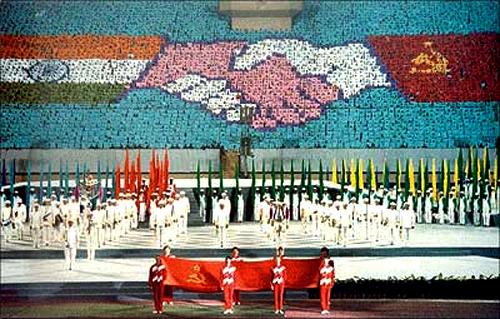
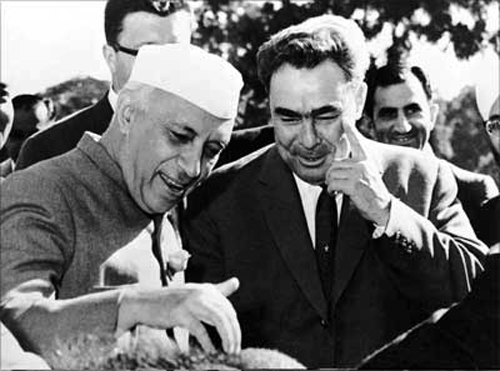

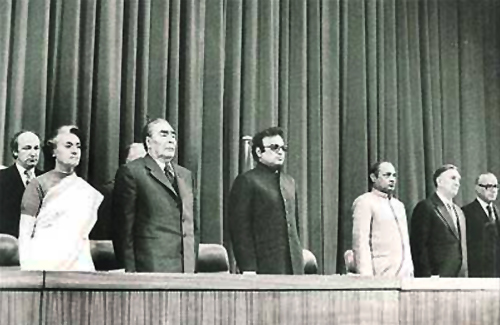
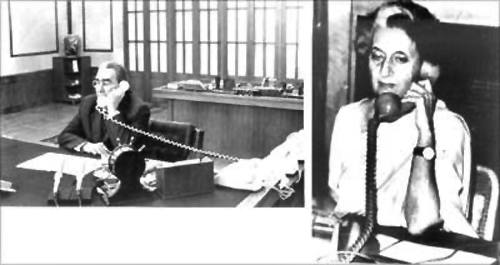
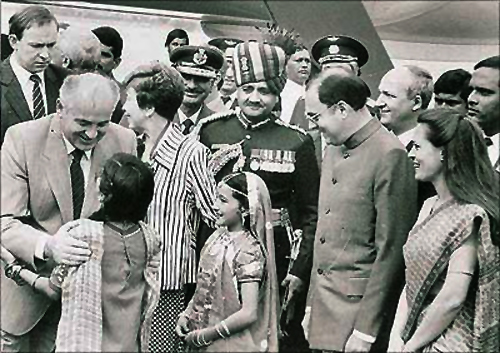
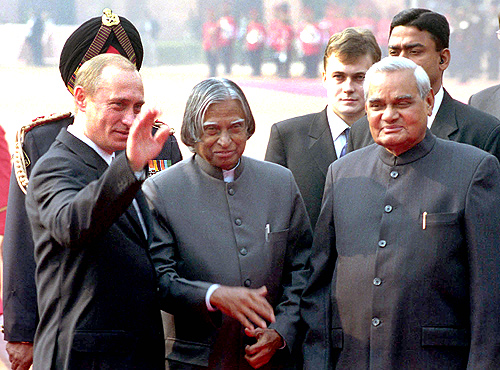

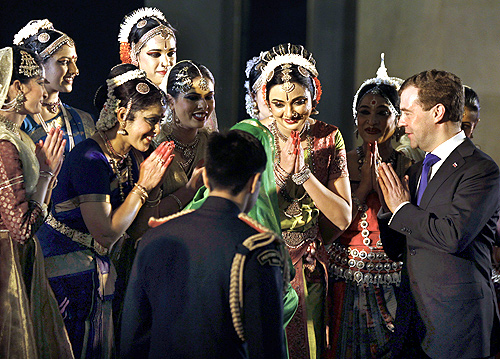

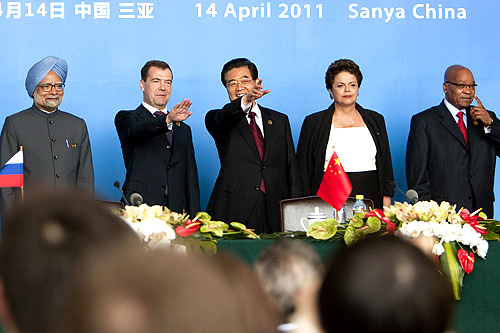
article